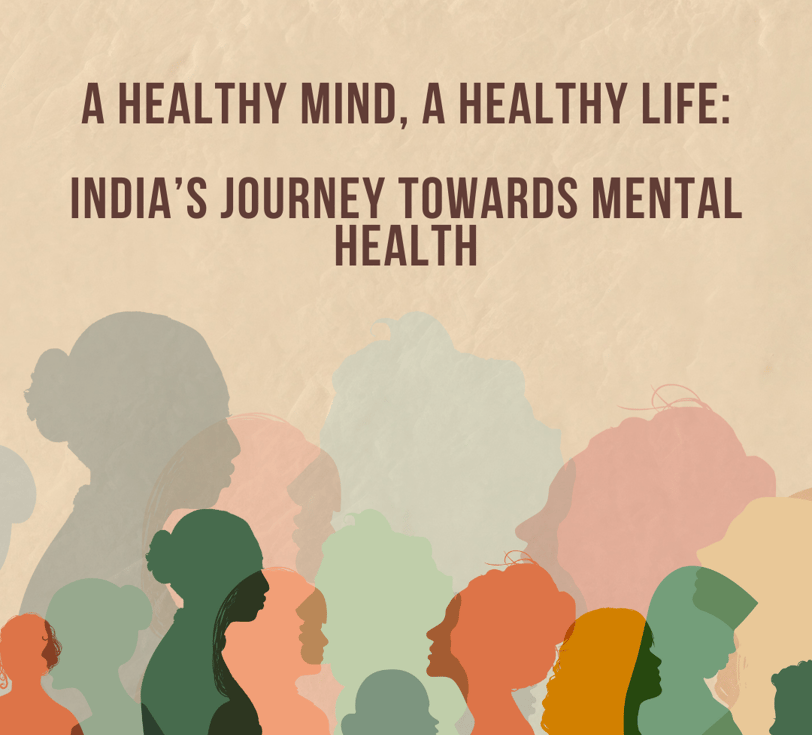A HEALTHY MIND, A HEALTHY LIFE: INDIA’S JOURNEY TOWARDS MENTAL HEALTH
12/25/20243 min read


"Mental health is how we think, feel, and act as we cope with life. It also helps determine how we handle stress, relate to others, and make choices."
When we hear the word "mental health," we typically think of the term “insane”. We picture something that resembles receiving an electric shock in a pitch-black space resembling a prison. But mental health is not limited to that. Our emotional, psychological, and social well-being are all parts of our mental health. It influences our thoughts, emotions, and behavior. It influences how we respond to stress, interact with others, and make healthy decisions. The mind is an integral part of the body and should be treated with the same care and attention as any other aspect of our physical health. There is no health without mental health.
Changing societal attitudes toward mental health is a complex and ongoing process that requires the efforts of individuals, organizations, and governments. The COVID-19 pandemic has increased awareness about mental health issues, as many people have experienced stress, anxiety, and other mental health challenges during the pandemic.
The National Mental Health Program (NMHP), established in 1982, was the first program established after India gained independence. Following WHO recommendations, it provided mental health services to the public within the framework of the community's general health care system[1]. The NMHP goals were also included in the District Mental Health Program (DMHP) in 1996. However, there was very little knowledge about mental health, people were embarrassed to ask for help, and there was a dearth of qualified people to provide treatment.
However, the Union Health Minister of India, under the BJP-led Union Government, Dr Harsh Vardhan, launched the first National Mental Health Policy in 2014[2]. The policy focused on improving the availability and quality of mental health services and technologies, promoting awareness and education about mental health issues in the community, and promoting research and innovation in the mental health sector.
A National Mental Health Survey was in 2015-16 conducted by the Indian government with the contribution of the National Institute of Mental Health and Neuroscience all over India, to analyze the situation and the issues that the population of India was facing in terms of mental health[3].
Later on, The Mental Health Care Act, of 2017 was amended in India that replace the Mental Health Act, of 1987, to make improvements to the act with more features and provisions. The main focus of the former act was to create a network nationwide to provide mental health care services. But unfortunately, the act did not focus on the rights of people with mental illness. Its main focus was to provide treatment to the mentally ill. There were no provisions or steps to spread awareness about the same. On the contrary, the Mental Healthcare Act 2017's main objectives are to provide mental health care and services to people with mental illness (PMI), as well as safeguard, promote, and uphold their legal rights while doing so[4]. Also, the punishment for someone who attempts suicide has been denied by the 2017 law.
Also, in 2018, the Ayushman Bharat scheme was launched that provides insurance coverage up to Rs. 5 lakhs. The 12 comprehensive primary healthcare packages offered by the Ayushman Bharat Health and Wellness Centers Scheme also covered mental health. It provides coverage for mental illness for the first time. People who suffer from mental illnesses are eligible for free treatment under the scheme.
The Government of India, keeping in mind the effect of COVID-19 and Quarantine measures, launched many platforms for the support of mental health and well-being. The Mental Health and Normalcy Augmentation System (MANAS) application is available for the same. It provides assessment tools, self-help resources, tips, and features that allow users to connect with mental health professionals and other users for support and advice. Another program is MANODARPAN, which provides a toll-free number.
(8448440632) to contact during any psychological emergency to the students[5]. There is also a website (https://manodarpan.education.gov.in/) present which has all the required information regarding mental health and well-being.
For the people who live in underserved areas, and have mobility issues to receive in-person care, another program was launched on 10th October 2022 for all Indian citizens, The National Tele-Mental Health Program. In this program, there is a toll-free number (14416) available round the clock, for people to access high-quality mental health counseling and care services in their preferred language. There is also a website (https://telemanas.mohfw.gov.in/) available for the same.
According to the website, 1693360+ calls have been received from all over the country. In such a brief amount of time, it's a truly enormous number. It demonstrates how approaches towards mental health have been evolving, while our union government has made it even easier and more affordable to avail of the service. Even many programs provide free mental health services, so the low socio-economic group can also have better treatment without financial exploitation.
References
[1] World Health Organisation
[2] https://pib.gov.in/newsite/printrelease.aspx?relid=110417
